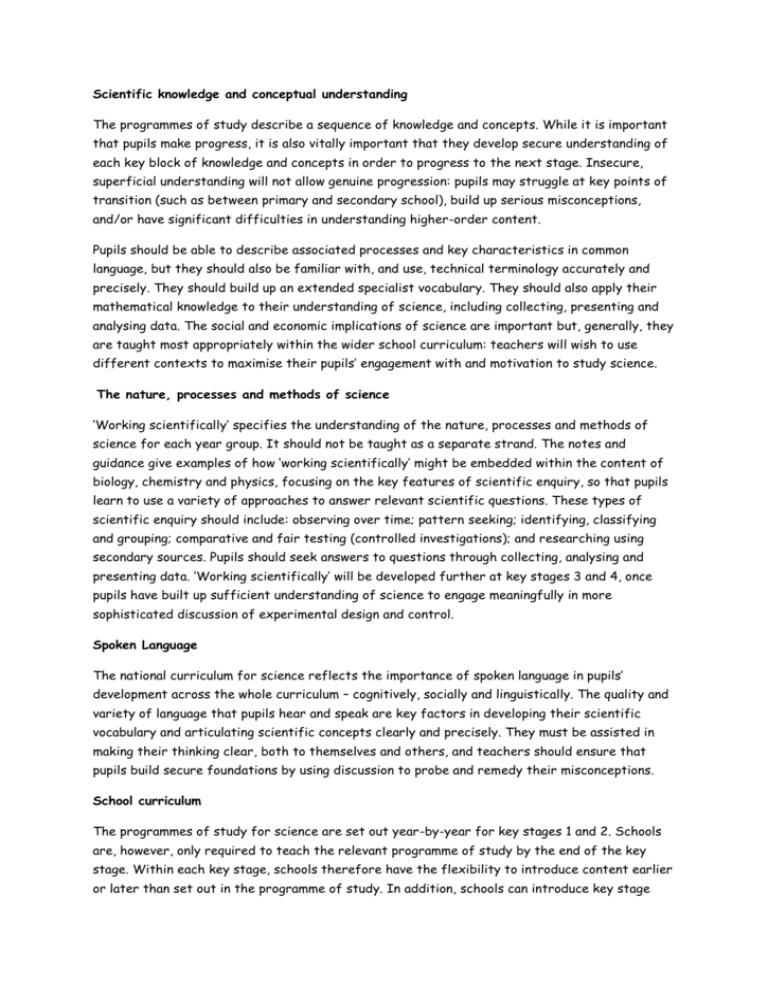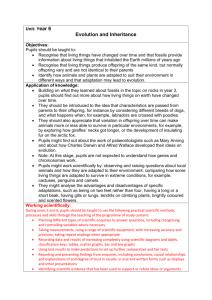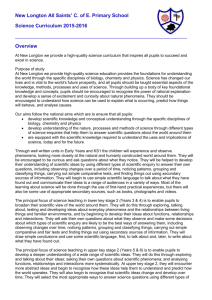Science curriculum overview
advertisement

Scientific knowledge and conceptual understanding The programmes of study describe a sequence of knowledge and concepts. While it is important that pupils make progress, it is also vitally important that they develop secure understanding of each key block of knowledge and concepts in order to progress to the next stage. Insecure, superficial understanding will not allow genuine progression: pupils may struggle at key points of transition (such as between primary and secondary school), build up serious misconceptions, and/or have significant difficulties in understanding higher-order content. Pupils should be able to describe associated processes and key characteristics in common language, but they should also be familiar with, and use, technical terminology accurately and precisely. They should build up an extended specialist vocabulary. They should also apply their mathematical knowledge to their understanding of science, including collecting, presenting and analysing data. The social and economic implications of science are important but, generally, they are taught most appropriately within the wider school curriculum: teachers will wish to use different contexts to maximise their pupils’ engagement with and motivation to study science. The nature, processes and methods of science ‘Working scientifically’ specifies the understanding of the nature, processes and methods of science for each year group. It should not be taught as a separate strand. The notes and guidance give examples of how ‘working scientifically’ might be embedded within the content of biology, chemistry and physics, focusing on the key features of scientific enquiry, so that pupils learn to use a variety of approaches to answer relevant scientific questions. These types of scientific enquiry should include: observing over time; pattern seeking; identifying, classifying and grouping; comparative and fair testing (controlled investigations); and researching using secondary sources. Pupils should seek answers to questions through collecting, analysing and presenting data. ‘Working scientifically’ will be developed further at key stages 3 and 4, once pupils have built up sufficient understanding of science to engage meaningfully in more sophisticated discussion of experimental design and control. Spoken Language The national curriculum for science reflects the importance of spoken language in pupils’ development across the whole curriculum – cognitively, socially and linguistically. The quality and variety of language that pupils hear and speak are key factors in developing their scientific vocabulary and articulating scientific concepts clearly and precisely. They must be assisted in making their thinking clear, both to themselves and others, and teachers should ensure that pupils build secure foundations by using discussion to probe and remedy their misconceptions. School curriculum The programmes of study for science are set out year-by-year for key stages 1 and 2. Schools are, however, only required to teach the relevant programme of study by the end of the key stage. Within each key stage, schools therefore have the flexibility to introduce content earlier or later than set out in the programme of study. In addition, schools can introduce key stage content during an earlier key stage if appropriate. All schools are also required to set out their school curriculum for science on a year-by-year basis and make this information available online. Attainment targets By the end of each key stage, pupils are expected to know, apply and understand the matters, skills and processes specified in the relevant programme of study. Overview of units across KS2 Year 1 Plants Working Scientifically Year 2 All living things and their habitats Year 3 Plants Working Scientifically Animals including humans Everyday materials Seasonal Changes Plants Animals including humans Use of everyday materials Rocks Light Forces and magnets States of matter Sound Electricity Earth and Space Forces Light Electricity Animals including humans Animals including humans Year 4 All living things Year 5 All living things Animals including humans All living things Animals including humans Working Scientifically Year 6 Properties and changes of materials Evolution and inheritance Year 1 and Year 2 had Light and Sound units in the draft curriculum. These were then removed so are not statutory. Each year group can choose the order in which the topics are covered, to allow for any crosscurricular links. As long as all topics are covered by the end of the year. For the next academic year - 2014/2015 – Year 5 will need to do ‘Sound’ as they will miss this topic as didn’t cover it in year 4 with the old curriculum.


![afl_mat[1]](http://s2.studylib.net/store/data/005387843_1-8371eaaba182de7da429cb4369cd28fc-300x300.png)






